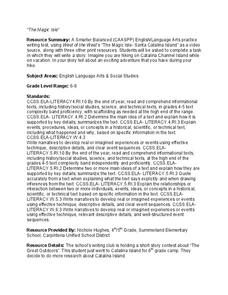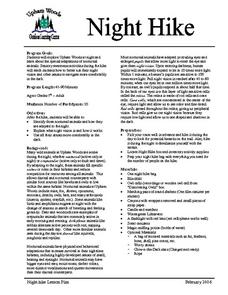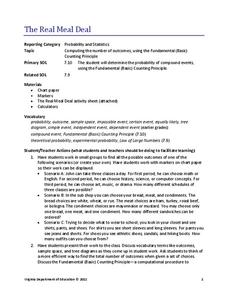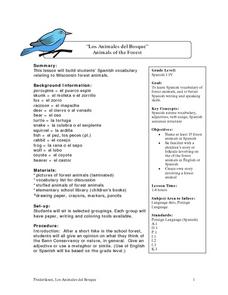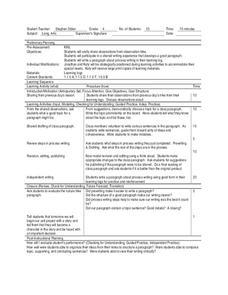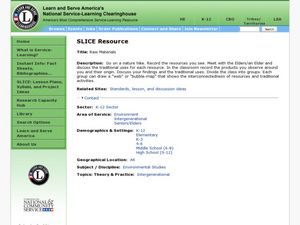Curated OER
Make Words
In this making words worksheet, learners, utilizing the word chickadee, make at least sixteen words from the letters only found in chickadee.
Curated OER
Observation Hike
Students participate in an observational hike to study the natural surroundings. In this observational hike lesson, students hike through a state park and observe the plant and animal life. Students learn about appropriate...
Curated OER
Rhyming Words
In this rhyming worksheet, students read groups of rhyming words. The first list included words with the sound you hear in by. A second list has rhyming words with the sound you hear in cow.
Curated OER
Biodiversity Word Walk
Young scholars visit grounds where hidden letters are revealed. Once the hike is finished the jumbled letters are pieced together to spell a single theme word. The word offered here is Diversity, which at nine letters, means nine stops.
Channel Islands Film
Magic Isle: Lesson Plan 3
Middle schoolers complete a writing assessment task to demonstrate their ability to craft a narrative based on a variety of informational texts. They view West of the West's documentary Magic Isle, read three print resources about...
Curated OER
ELD Lesson Plan: Courage
What is true courage? Your class can explore the answer with these three Houghton-Mifflin stories ("Hatchet," "Passage to Freedom," "Climb or Die," and "The True Confessions of Charlotte Doyle"), which feature courageous characters and...
Curated OER
Survival Lesson Plan
Students participate in a survival lesson that teaches four steps to take in the event of dealing with an emergency. The skill of improvising is practiced and its importance is stressed as being resourceful. Students also cover the...
Curated OER
Night Hike
Students explore Upham Woods at night and investigate about the special adaptations of nocturnal animals. They identify three nocturnal animals and how they are adapted to the night. Students explain what night vision is and how it works.
Curated OER
Food Chains
Fourth graders study food chains, producers, consumers, and decomposers. They play a food chain game and create food chain mobiles or posters. They take a nature hike around the school and observe various parts of a food chain.
Virginia Department of Education
The Real Meal Deal
Burgers and salads and sodas, oh my! Scholars use a menu to investigate the Fundamental Counting Principle. They create tree diagrams to illustrate the number of possible choices for each given scenario.
Curated OER
Tree Hunt
Students identify the common trees of Iowa and make observations while creating a key. In this tree hunt lesson, students write a letter to the Iowa Department of Natural Resources to receive a pamphlet of Common Trees of Iowa. Students...
Curated OER
Say and Spell Long Vowel Bossy E Board Game
Students practice saying and spelling long vowel "bossy E" words. In this spelling activity, students play a board game that requires them to look at a picture, say and spell the word. The first person to the end wins.
Curated OER
Animals Of The Forest
Students conduct research into the words found to relate to the forests of Wisconsin. They write the words in complete sentences in the correct context. With the writing also includes the oral practice. Students also create their own...
Curated OER
Edible Wild Plants
Students explore the benefits of recognizing edible wild plants. In this wild plant lesson, students collect, make ready and eat edible plants. Students answer questions about the plants.
Curated OER
Creative Writing
Fourth graders participate in an observation hike in this lesson. They orally share observations from their hike, and develop a paragraph in a shared writing exercise. Finally, the write their paragraph about process writing in their...
Curated OER
Raw Materials
Students participate in a nature hike and record the natural resources observed. They compare traditional and modern versions of everyday use items, and create graphic organizers that demonstrate the interconnectedness of resources.
Curated OER
My First Biography: Christopher Columbus Storia Teaching Guide | Scholastic.com
Sail with Christopher Columbus on a biographical reading adventure. Young explorers learn about the life of Sir Columbus as they hone their comprehension skills through guiding questions, shared reading, and fluency practice. Included in...
Forest Foundation
The Nature of Trees
Young botanists examine the different parts of tress and then draw parallels between the functions of these parts and the function of parts of the human body.
Curated OER
My Habitat
Students explore the environment they live in. In this habitats lesson, students define habitat and create a web in kidspiration. Students take a walk outside and record what they see and hear and may take pictures as well. Students...
Curated OER
Life Cycle of Trees
Turn your students into young tree-tectives with this fun science investigation into the life of trees. To begin, a class volunteer gets dressed up in a tree costume as the different parts of trees are introduced. Then, the class...
Curated OER
Electricity and Food: From Glowing Pickles in Citrus Batteries
Fifth graders explore electrical concepts and host a guest speaker. This lesson sets up guidelines for students to follow when they have a guest speaker. Students are primed to become actively involved in a lecture or discussion, while...
Curated OER
Orienteering - The Fundamentals
Students investigate the concept of a compass and it has been used in the past and in modern times. They practice using it in the wilderness in order to test its importance in various exploring activities. Each activity is accompanied by...
Curated OER
Conductors and Insulators
Fifth graders explore conductors and insulators. In this science lesson, 5th graders act as electrons moving through a wire. Students break into groups representing conductors and insulators and explore how they work with electrons.
Curated OER
Where in the world is the Hydra Electron?
Walk your class through the journey water takes once it leaves your kitchen sink, all the way through the water cycle. Demonstrations support your lecture. This plan is thoroughly written, but ideally you would follow it up with water...




